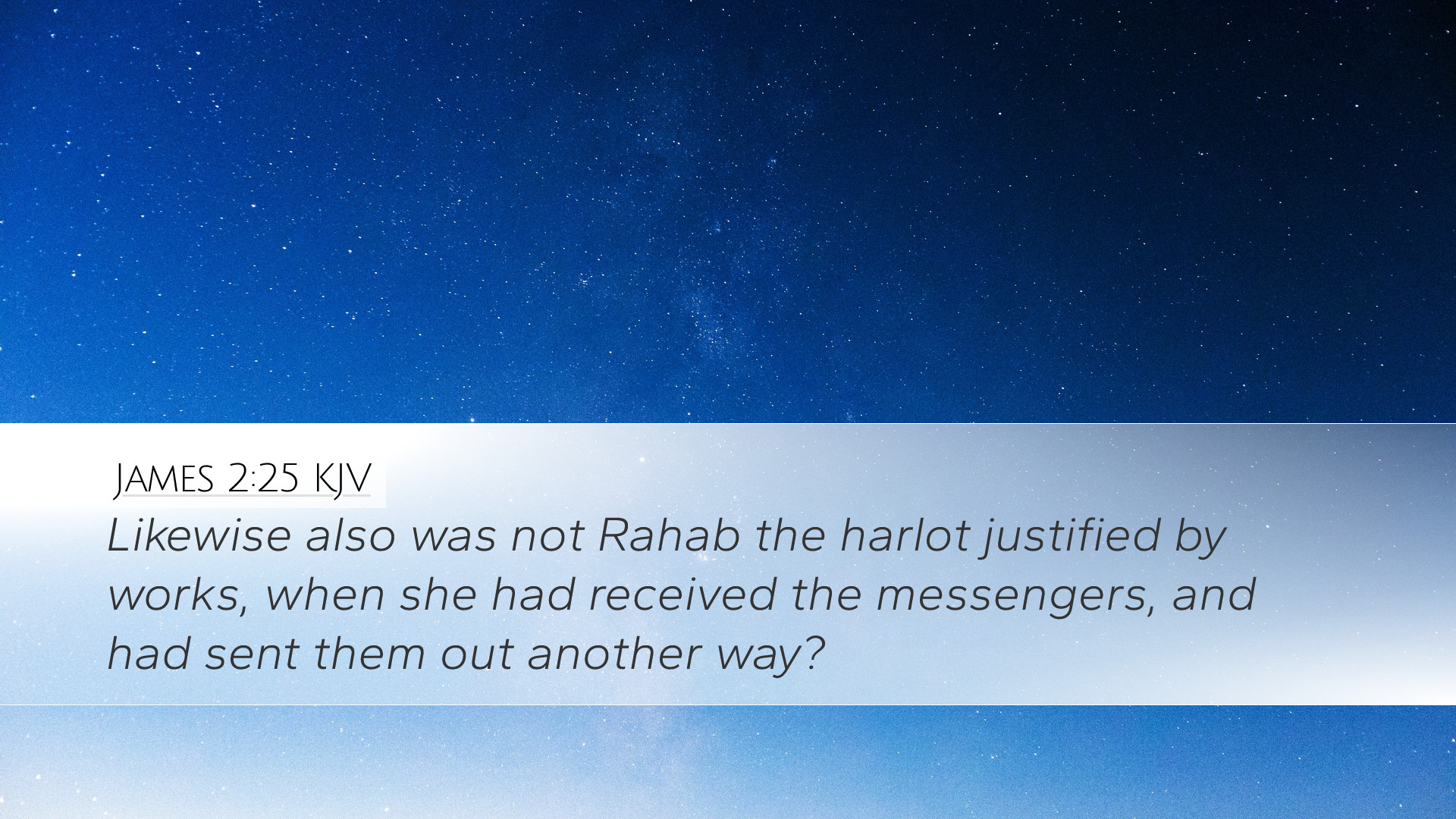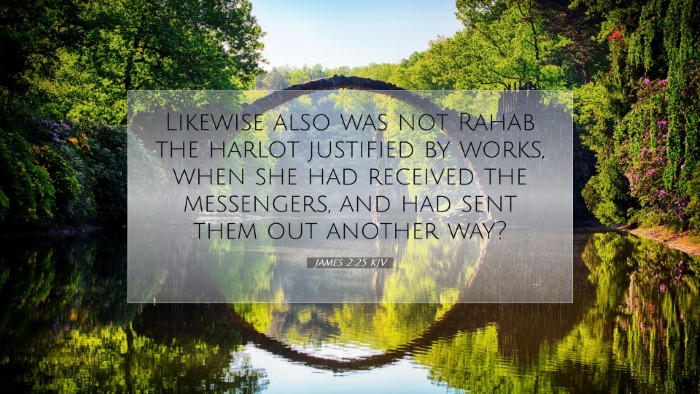Old Testament
Genesis Exodus Leviticus Numbers Deuteronomy Joshua Judges Ruth 1 Samuel 2 Samuel 1 Kings 2 Kings 1 Chronicles 2 Chronicles Ezra Nehemiah Esther Job Psalms Proverbs Ecclesiastes Song of Solomon Isaiah Jeremiah Lamentations Ezekiel Daniel Hosea Joel Amos Obadiah Jonah Micah Nahum Habakkuk Zephaniah Haggai Zechariah MalachiJames 2:25
James 2:25 KJV
Likewise also was not Rahab the harlot justified by works, when she had received the messengers, and had sent them out another way?
James 2:25 Bible Commentary
Commentary on James 2:25
Verse: "Likewise also was not Rahab the harlot justified by works, when she had received the messengers, and had sent them out another way?" (James 2:25)
Introduction
The Epistle of James emphasizes a practical faith, contending that faith without works is dead. In examining James 2:25, the author refers to Rahab, the harlot, highlighting her justification through works as a demonstration of genuine faith. This verse serves to illustrate the union of faith and works, reinforcing the idea that true faith manifests in action.
Contextual Analysis
To fully grasp the significance of James 2:25, it is essential to understand its broader context. James is addressing the issue of favoritism, urging believers to live out their faith through deeds of love and mercy. In the preceding verses, he advocates for faith demonstrated through concrete actions, using the example of Abraham to depict righteous living. In this light, Rahab's narrative serves as another powerful illustration, emphasizing that anyone, regardless of their past, can show faith that results in righteousness.
Commentary Insights
-
Matthew Henry:
Matthew Henry underscores the role of Rahab as a remarkable example of faith in action. He notes that her response to the spies was not merely a passive belief but an active decision that put her life at risk. Henry points out that her works were instrumental in heralding her faith, allowing her to be counted among the faithful. He emphasizes that “justified by works” refers not to the works as a means to earn salvation, but rather as evidence of the faith that justifies.
-
Albert Barnes:
Barnes elaborates on the concept of justification in this context. He argues that while faith is fundamental for justification before God, works are the fruits that validate this faith in the earthly sphere. Barnes highlights that Rahab’s actions were not just random acts; they were manifestations of her belief in God and His power. He emphasizes the importance of recognizing that even a public sinner can show a saving faith that is just as valid as that of the patriarchs.
-
Adam Clarke:
Clarke provides an exegetical examination of Rahab’s life, emphasizing her transition from a harlot to a heroine of faith. He points out that Rahab’s faith was demonstrated through her decisive actions, choosing to protect the Israelite spies rather than remain loyal to her people. Clarke draws attention to the importance of personal belief that leads to acts of obedience, noting that her justification was rooted in the risk she took for the God of Israel. He asserts that this example affirms the inclusivity of the Gospel, showing that all who believe can be justified by their faith.
Theological Reflections
James 2:25 invites significant theological reflection regarding the nature of faith and works. Theologically, this verse counters the notion that intellectual assent to God’s existence suffices for demonstrating faith. Instead, it encourages believers to embody their faith through actions that reflect their commitment to God. The story of Rahab challenges contemporary understandings of morality and faith, asserting that God's grace transcends societal norms and past mistakes.
Practical Implications for Believers
For pastors, students, theologians, and Bible scholars, the lesson from James 2:25 is profound. It challenges believers to consider how their faith is evidenced in their daily lives. True faith manifests in action; whether through acts of kindness, hospitality, or standing against injustice, works are a tangible expression of faith. This verse also calls the church to embrace individuals from all walks of life, affirming that salvation is available to everyone, mirroring Rahab's story.
Conclusion
In conclusion, James 2:25 serves as an essential reminder of the interconnection between faith and works. Rahab’s example illustrates the transformative power of faith that leads to righteous deeds. As we reflect on this passage, may we be inspired to live out our faith boldly and may our actions continually reflect our trust in God. The essence of righteousness is not found merely in correct belief but in the fruits of that belief as displayed through our works.


